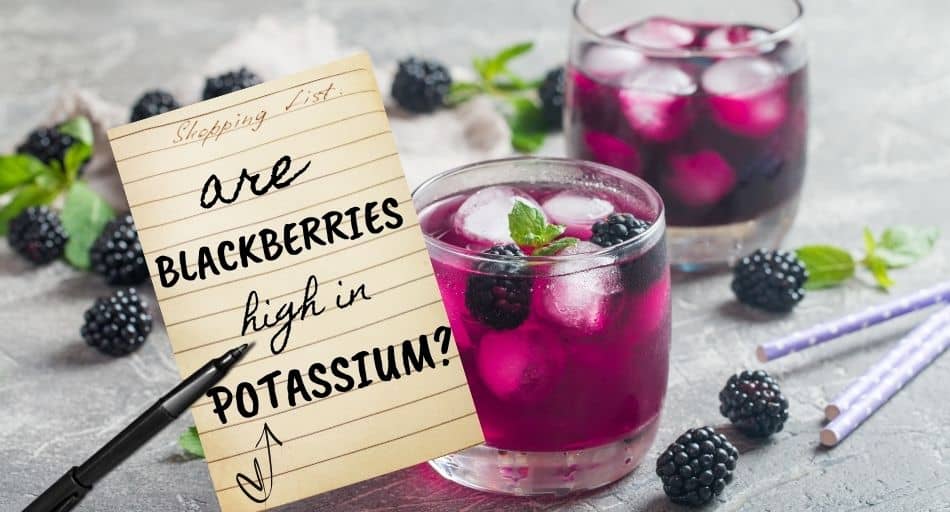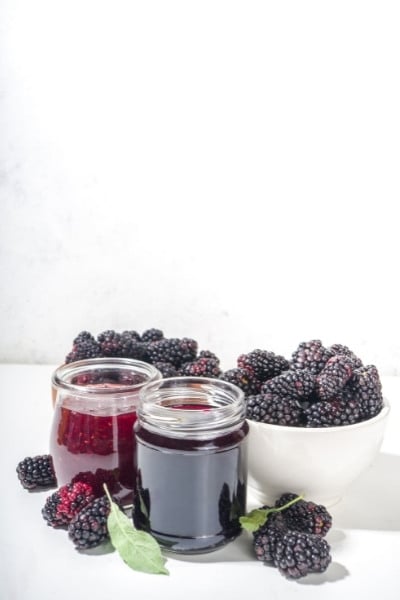Eating fruits and vegetables is essential to maintaining a healthy, balanced diet. This is because they're rich in many essential nutrients, minerals, and vitamins that help you stay fit and clear from various diseases.

However, when you have to stick to specific dietary requirements, you may not be able to consume all veggies and fruits.
For instance, if you follow a low-potassium diet, you have to familiarize yourself with the potassium content of many food products to ensure you can add them to your diet, such as blackberries. So are blackberries high in potassium?
Table of Contents
Are Blackberries High In Potassium?
Blackberries contain less than 200mg of potassium in a single serving, qualifying them as low-potassium fruit. This also means that they can be added to a kidney-friendly diet. On top of that, blackberries are loaded with antioxidants and many nutrients that help you stay healthy and prevent various diseases.
They're also incredibly delicious and easy to add to any diet, no matter which you follow.
How much potassium do blackberries contain?
Just half a cup of blackberries contains approximately 115mg of potassium. As a result, it can be safely incorporated into a low-potassium, kidney-friendly diet. It won't cause any pain while urinating and other issues that people who are sensitive to potassium experience.
Blackberries are very rich in minerals and vitamins that help keep your organs — including kidneys — healthy and protect them from damage. As a result, they are an excellent addition to a balanced diet, rich in natural and fresh ingredients.
What's more, there is barely any difference in terms of potassium content between blackberries and wild blackberries. So it's a good idea to alternate between different varieties to get as many minerals and vitamins as possible.
It would be best to remember that potassium is still an essential mineral regardless of the diet you follow. It helps offset the adverse effects of sodium on your blood pressure and contributes to many metabolic processes.
Therefore, make sure not to remove this mineral from your diet entirely and listen to your doctor's recommendations.
Are blackberries healthy?
Blackberries are often called a superfood since they're very nutritious yet low in calories. In fact, half a cup of blackberries contains only 30 calories.
Most of these calories come from carbohydrates, including fiber that helps soak up excess stomach acid and feed the good bacteria in your stomach.
Because of that, it helps keep your digestive system healthy, preventing many health issues, including kidney infection. As a result, blackberries are a great addition to a low-potassium diet.
Blackberries are also very rich in vitamin K. This fat-soluble micronutrient helps create various proteins needed for blood clotting. This means that this vitamin speeds up wound healing and prevents excessive bleeding when you get hurt.

Vitamin K contributes to keeping your bone tissues healthy, preventing the development of bone conditions, such as osteoporosis and arthritis.
Another wonderful health benefit that comes from consuming blackberries is their high antioxidant content. Specifically, these berries are very high in plant compounds and antioxidants that help remove free radicals out of your body, reduce oxidative stress, and prevent many diseases, including certain types of cancer.
In addition, many studies show that consuming blackberries can help prevent DNA damage that may lead to cancer and many severe mutations that can be life-threatening. Therefore, it's important to consume a lot of antioxidant-rich foods.
Moreover, consuming blackberries can help reduce your blood sugar levels, thus reducing the risk of type 2 diabetes. This also prevents spikes in your blood sugar levels, preventing overeating, weight gain, and other serious health issues.
In addition, blackberries contain natural sugar, which means that it's less harmful than artificial sweeteners that most foods are loaded with these days. As a result, blackberries can be a great replacement for sugary desserts.
Is blackberry juice high in potassium?

A glass of canned blackberry juice contains around 338mg of potassium. This means that it should be either avoided or limited on a low-potassium diet. It's also very high in sugar and other additives that have a negative effect on your health, so you should avoid them too.
On the other hand, if you really enjoy blackberry juice, you can still have some every once in a while (if you can tolerate it).
One way to lower the potassium level of blackberry juice is to dilute it with some water or consume smaller amounts. That way, you can still enjoy this delicious drink without causing any adverse symptoms.
Are canned blackberries high in potassium?

A half-cup serving of canned blackberries contains around 127mg of potassium. Hence, it can be safely added to a low-potassium diet without causing any kidney issues. Canned blackberries might be more easily found in stores, especially when it's not the season for berries.
They're also still very high in minerals and nutrients, allowing you to stay as healthy as possible. However, try to check the list of ingredients before you purchase them because some brands contain lots of added sugar and other additives.
Can you take in too much potassium from blackberries?
Blackberries don't contain enough potassium to overdose on this mineral. This means that they can be included on a low-potassium diet without any issues. However, when doing so, make sure to control how much blackberries you consume since they're relatively easy to overindulge on.
This is particularly important since even though they're very healthy and rich in antioxidants, they're still high in sugar, and the potassium content can add up. As a result, if your potassium requirements are particularly low, it's best to consume blackberries in moderation.
Blackberries are a relatively low-potassium food as long as they're consumed in moderation. Furthermore, they're very high in minerals and vitamins that can help you stay healthy and protect your kidneys from damage.
They're also very easy to add to any diet as they're delicious and easily found in stores, in a fresh, frozen, or canned form. With all of these benefits, it's an excellent idea to have some of these berries every once in a while.
Don't know which foods are high in potassium? Read our article, 15 Best Food Sources of Potassium. We also have a guide to this important mineral: Potassium 101: All You Need To Know About Potassium.
